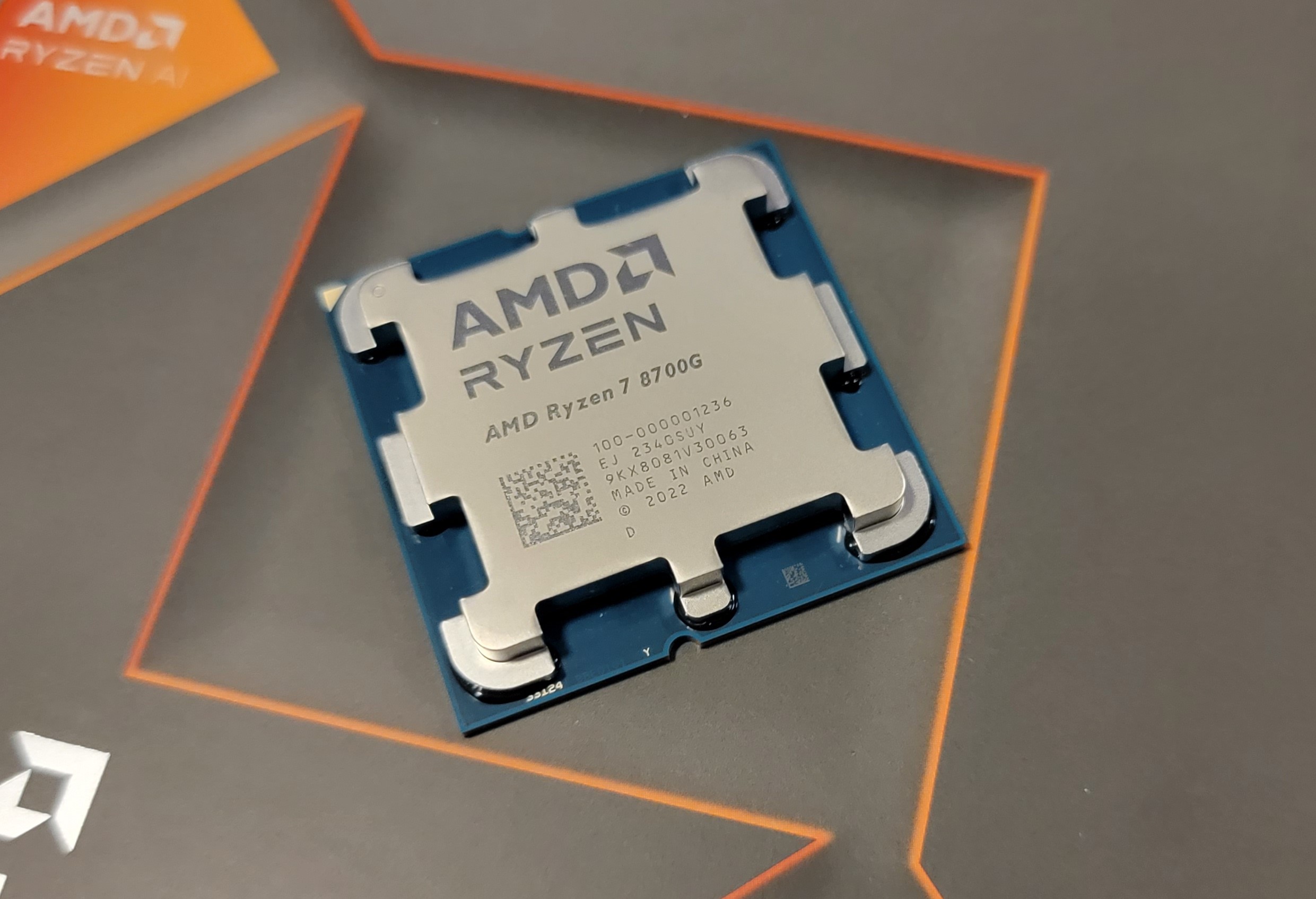Why you can trust Tom's Hardware
AMD Ryzen 7 8700G Integrated GPU Gaming Performance — The TLDR
We enabled AMD's Hyper-RX feature for two of our test configurations. This enables upscaling (RSR), frame generation (AFMF), Radeon Boost, and Anti-Lag+. We only used these settings for our 1080p iGPU tests and upscaled from 720p and 990p for demo purposes, as listed in the charts (more detail on the previous page). Hyper-RX does require compromising, to varying extents, on image quality. Whether or not the tradeoff for any given setting is acceptable is largely subjective, so keep that in mind when you view our test results. (Note: Our measurement utility doesn't measure the additional frames generated by AFMF — the only way to see that fps at present is through AMD's driver overlay.)
Below you can see the geometric mean of our integrated graphics gaming tests across five titles at 720p and 1080p, with each resolution split into its own chart. These are cumulative metrics, so individual wins vary on a per-title basis. You'll find the game-by-game test results further below.
Here are the Ryzen 7 8700G configurations listed in the charts:
- Ryzen 7 8700G: DDR5-5200, Default power limits
- Ryzen 7 8700G HYPR-RX 720p: Upscaling (RSR) from 720p to 1080p, DDR5-5200, Default power limits
- Ryzen 7 8700G HYPR-RX 990p: Upscaling (RSR) from 990p to 1080p, DDR5-5200, Default power limits
- Ryzen 7 8700G PBO EXPO: DDR5-6400 (EXPO), PBO enabled (adv. motherboard), 10X Scalar, +200 MHz CPU/GPU clock, FCLK at 2000 MHz (1:1/2), CPU/GPU +200 Mhz boost
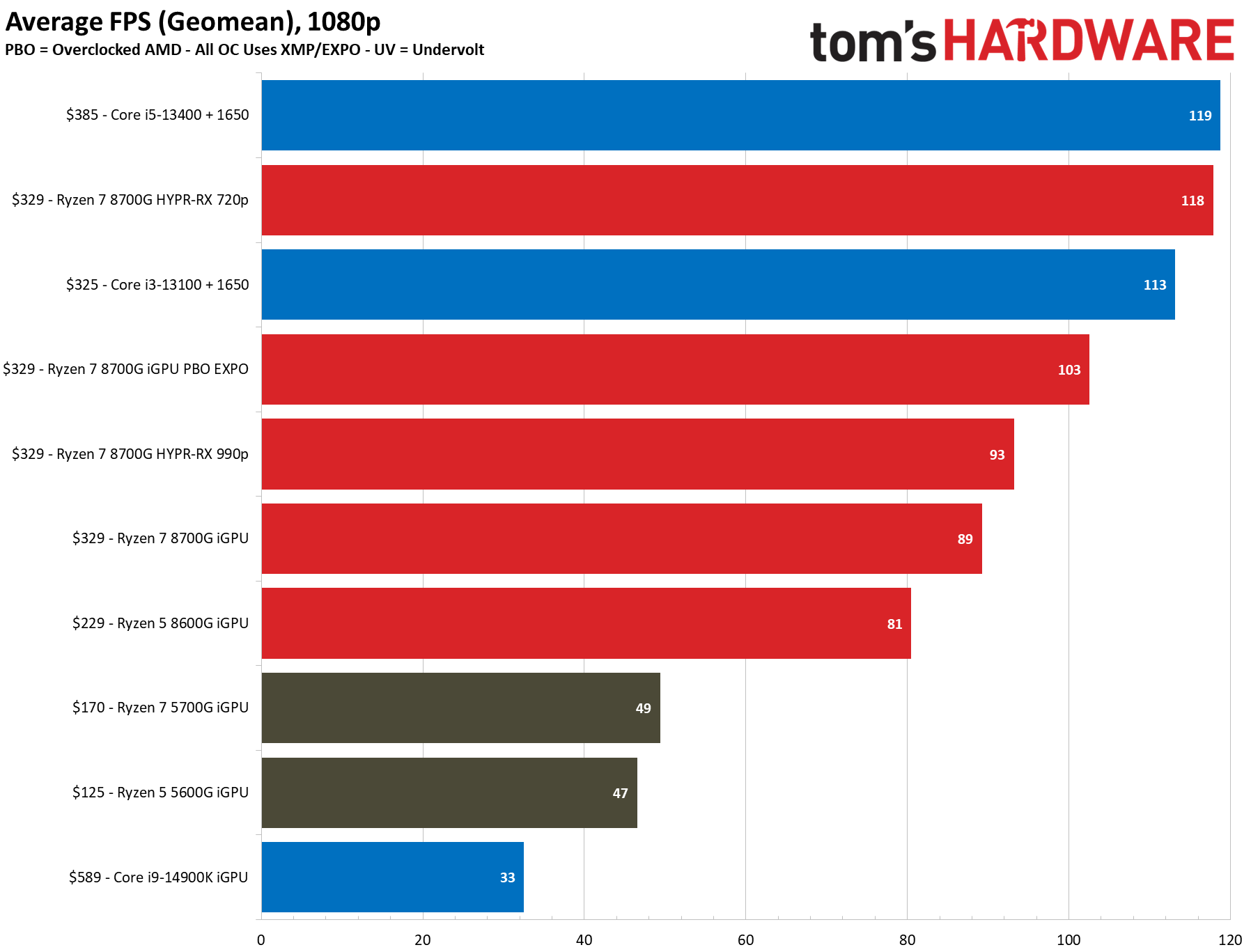
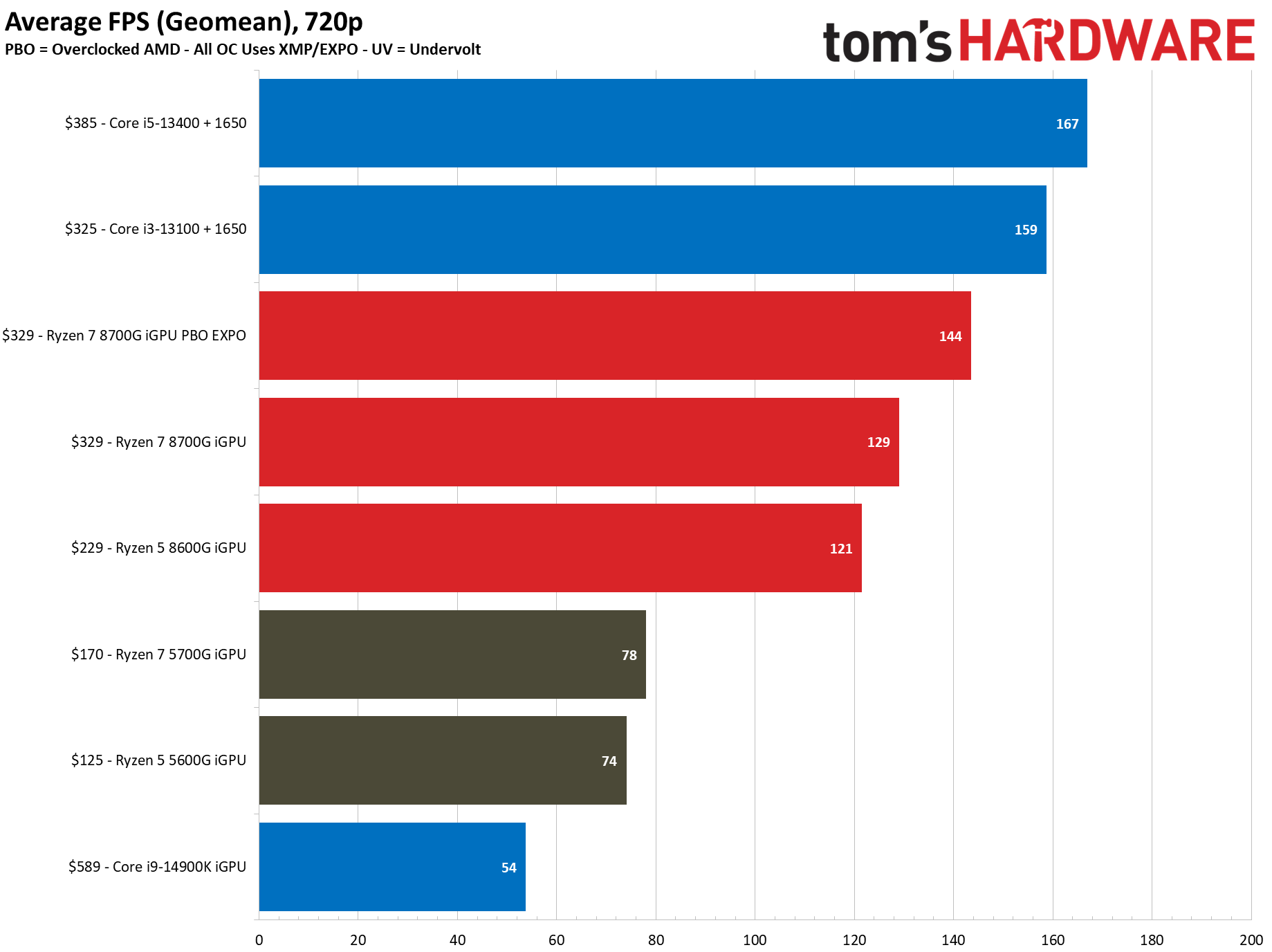
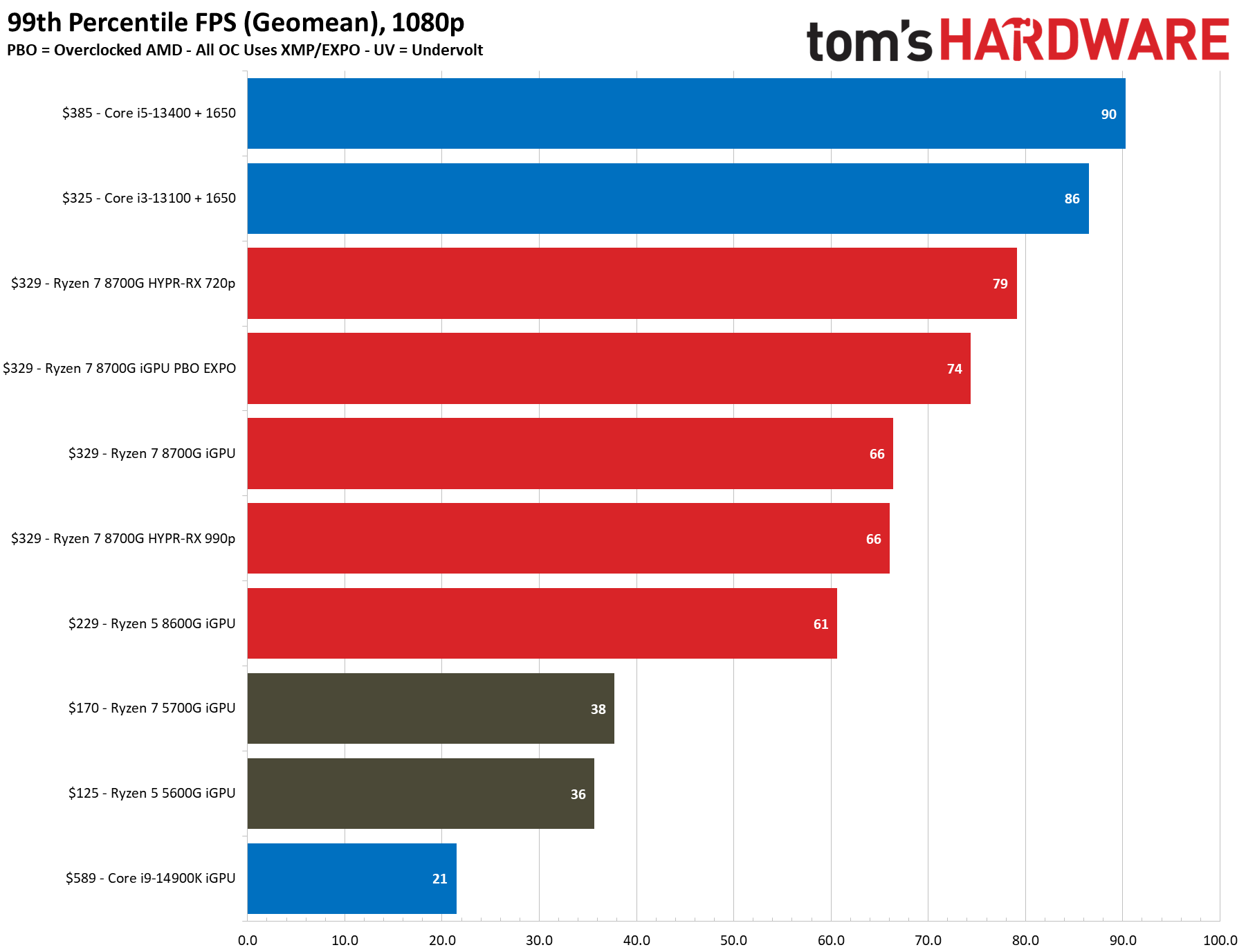
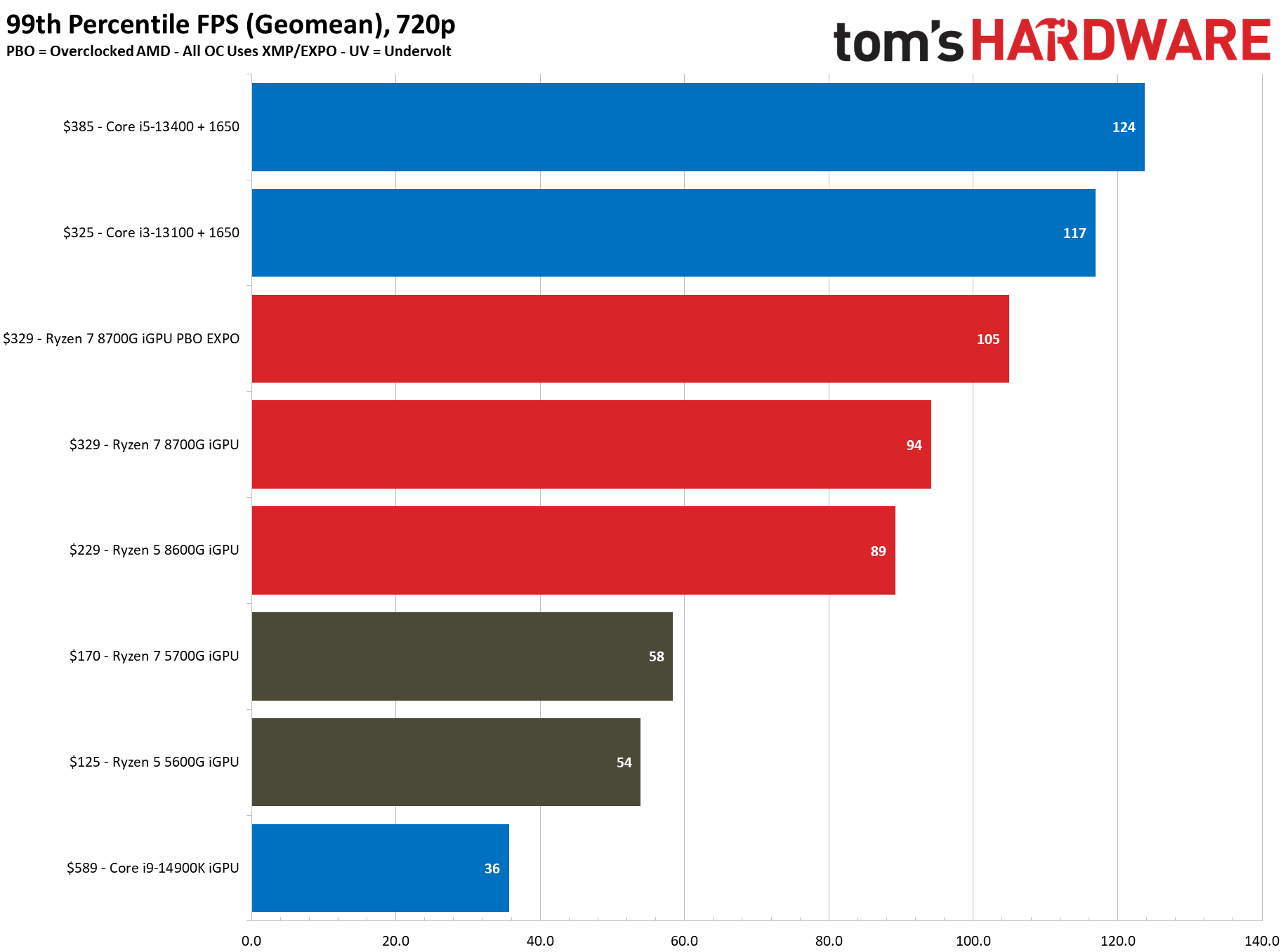
In its launch presentation, AMD shared benchmarks with the Ryzen 7 8700G going toe-to-toe with the Core i5-13400 paired with an Nvidia GTX 1650, so we recreated that setup with a GDDR6 1650. As we quickly learned, AMD conducted those benchmarks with Hyper-RX enabled, and as you can see in the cumulative 1080p result above, upscaling from 720p brought the 8700G within a single percentage point of the Core i5-13400 setup. Remember, though, that upscaling from 720p can cause a big reduction in image quality.
AMD's Hyper-RX defaulted the settings for several of our game titles to upscale from 990p, but even though a few games benefitted, some actually lost performance compared to the standard config, thus skewing our overall measurement. You'll need to check the individual game benchmarks further below to see which titles benefitted the most from 990p.
The Core i5-13400 config was 33% faster than the stock Ryzen 7 8700G without upscaling, but it was only 15% faster than the overclocked Ryzen 7 8700G configuration (again, no upscaling).
We also threw in a Core i3-13100 and GTX 1650 combo, and this also beat the stock and overclocked 8700G configurations. Notably, enabling Hyper-RX with upscaling propelled the 8700G past the 13100, but at the cost of image quality. Overall, this combo costs roughly as much as the 8700G but delivers 27% more performance. You could also step back to the Core i3-12100, which offers basically the same performance yet costs ~$30 less.
Turning to the more standard fare, the stock Ryzen 7 8700G is impressive — the chip is 10% faster than the Ryzen 5 8600G at 1080p and a whopping 81% faster than its predecessor, the Ryzen 7 5700G, highlighting just how long it has been since we've seen a GPU update to this series. Flipping to the next slide in the album finds the 8700G delivering similarly impressive performance in the spate of benchmarks we conducted at 720p.
Likewise, the Ryzen 5 8600G is 65% faster than the previous-gen flagship 5700G at 1080p, and 72% faster than the 5600G. The differences between these chips only shrinks by ~8% at 720p, leaving the 8600G as the clear leader.
Overclocking both the CPU cores and the memory to DDR5-6400 gives the 8700G a 15% gain, with most of that increase coming from the faster memory. We also ran a few tests with DDR5-6000, and found that the jump to DDR5-6400 only gave us about 3% more performance, highlighting that DDR5-6000 will be the price-to-performance sweet spot for overclockers. We also see larger gains from overclocking in some of the individual game benchmarks below.
We kept the Ryzen 5 5600G on our list of the Best CPUs for gaming for nearly three years, largely because it offers nearly identical performance to the more expensive 5700G — it's only four percentage points slower because the iGPU only has one fewer CU — but we see a much larger 10% gap between the two new models. That means the current-gen Ryzen 5 8600G might not be quite as impressive with this chip gen, largely due to the fact that it only has eight CUs compared to the 8700G's 12 CUs. Both of these chips will suffer from being memory-bound, though, so we won't know the full verdict until we overclock the Ryzen 5 8600G in our upcoming review.
As expected, even Intel's fastest iGPU is laughable in comparison; the 8700G is 169% faster than the Core i9-14900K's UHD Graphics 770 engine with 32 Xe EUs. Intel supports XeSS upscaling with its iGPUs, which can help in games that support it, but do note that XeSS comes in two flavors: XMX mode requires a dedicated Arc GPU, while DP4a mode (INT8) runs on everything else, including Intel's iGPUs. The issue is that DP4a mode has noticeably worse quality than XMX mode with XeSS 1.0; XeSS 1.1 improved things, and XeSS 1.2 gets them to nearly the same quality level, but XeSS 1.2 has so far only been used in eight games.
Of course, XeSS upscaling is also superior to RSR, which is really just FSR 1.0 at a driver level. Nvidia has had options for spatial upscaling and sharpening in its drivers since 2016, and Intel might add such a feature in the future. That would potentially allow Intel's iGPUs to put up a better fight — again, at the cost of image quality. That said, we didn't include AMD's Ryzen 7000 series iGPU, but it's even worse at gaming (I'll add some updated results here as time permits).
You can see the game-by-game breakdowns below.
Borderlands 3 on AMD Ryzen 7 8700G
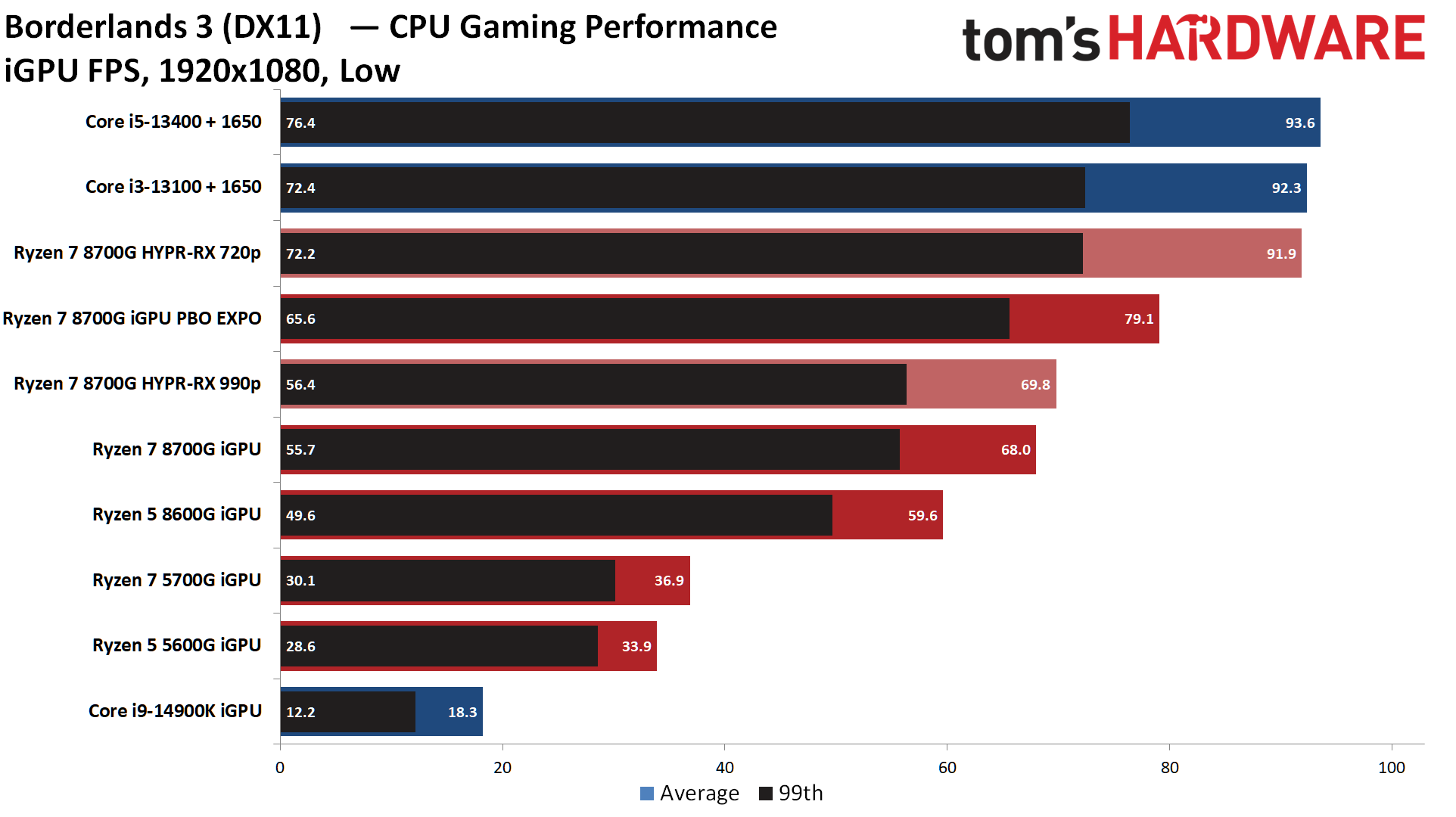
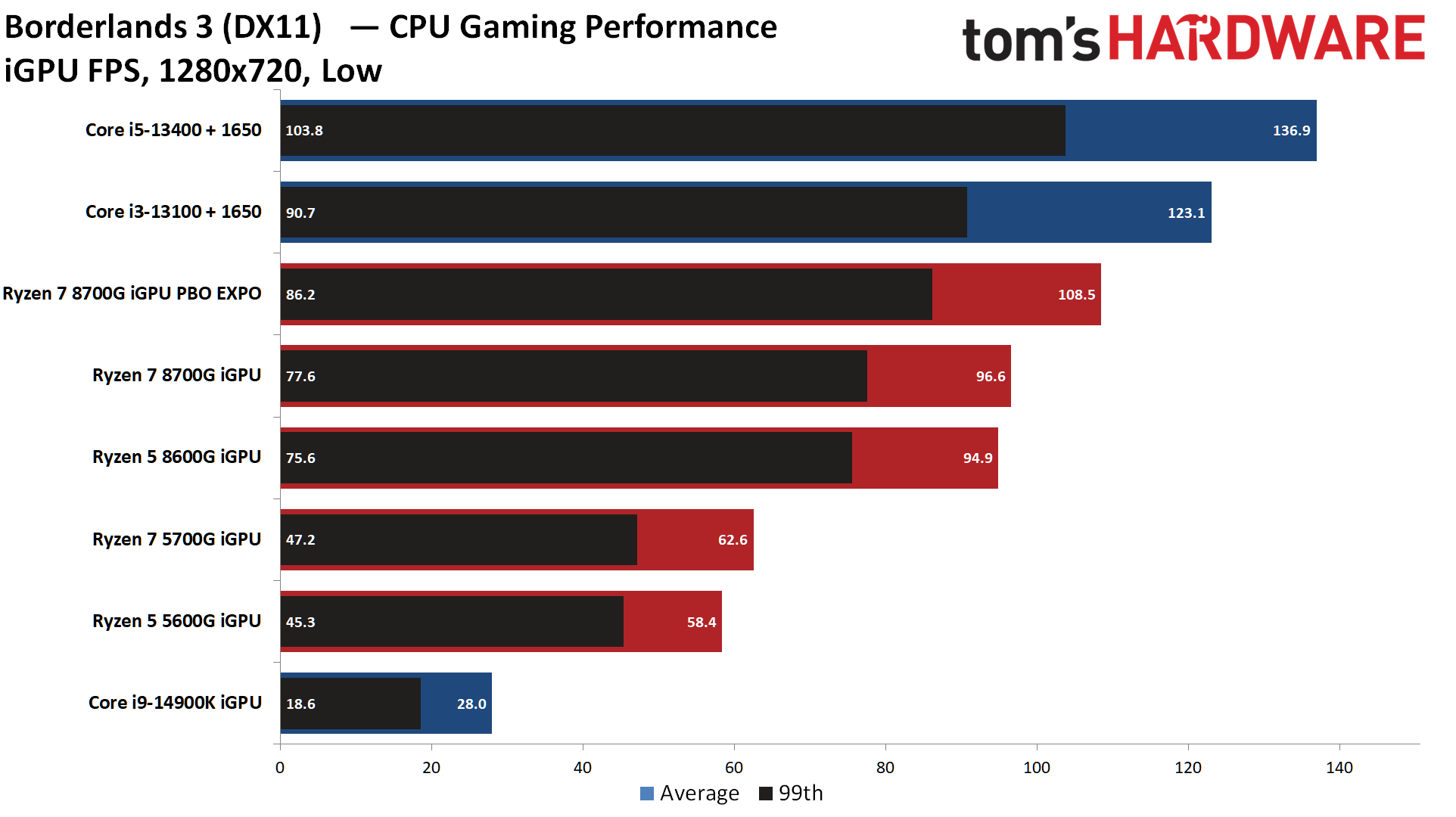
Be sure to click through to the next slide to see the 720p benchmark results. We can see the power of upscaling from 720p to 1080p, delivering a 35% increase in performance over the standard Ryzen 7 8700G stock configuration and essentially tying the Core i3-13100+GTX 1650 config. We chose to allow Hyper-RX to alter the game settings automatically, and it changed Borderlands 3 to 990p. However, upscaling from 990p to 1080p only delivered a 2.6% increase in performance.
Overclocking the CPU cores and memory delivered a 16% boost in framerates for this title, with most of that gain coming from the DDR5-6400 EXPO memory overclock. Combining overclocking with Hyper-RX will push peak performance even further.
Cyberpunk 2077 on AMD Ryzen 7 8700G
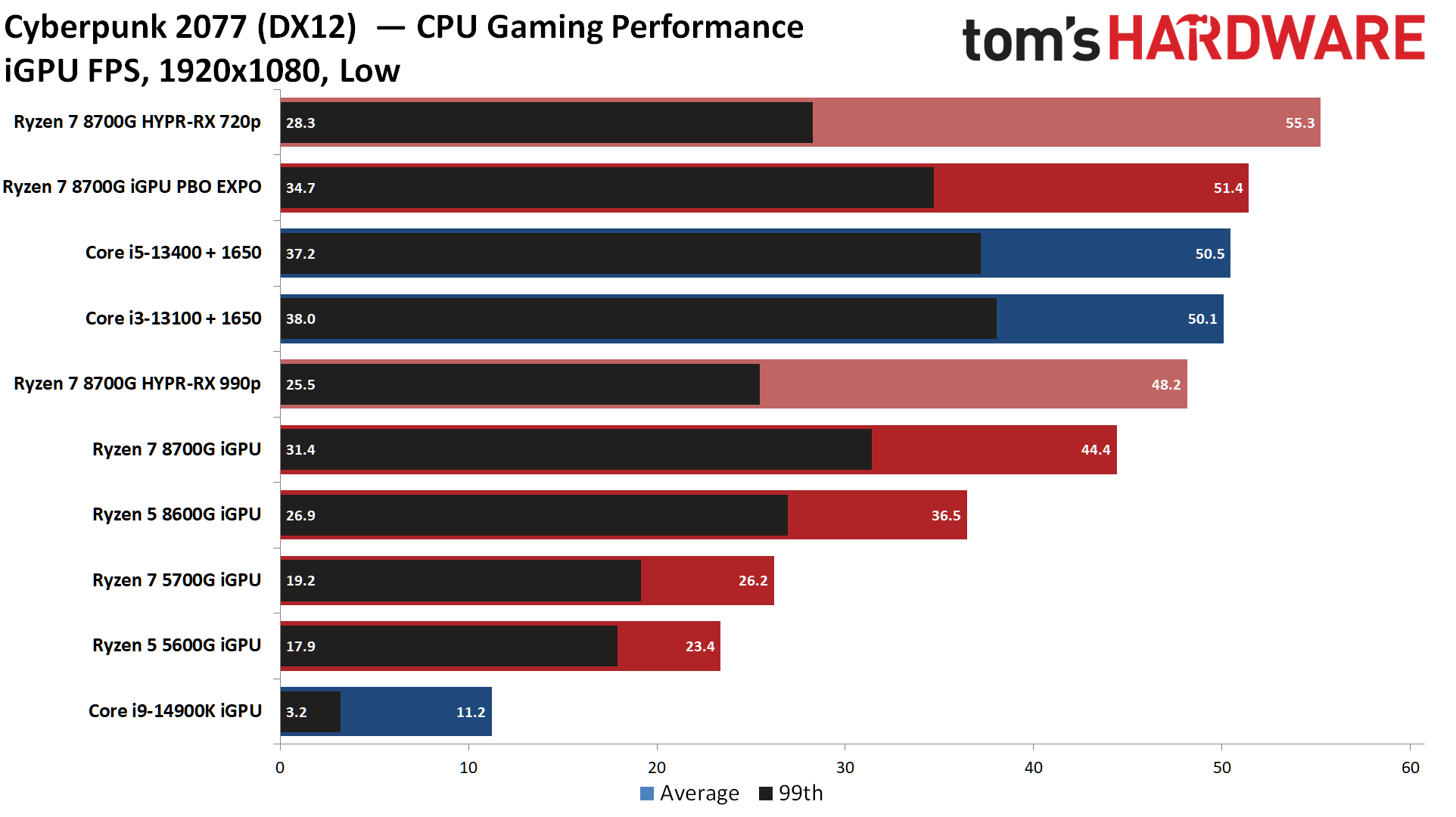
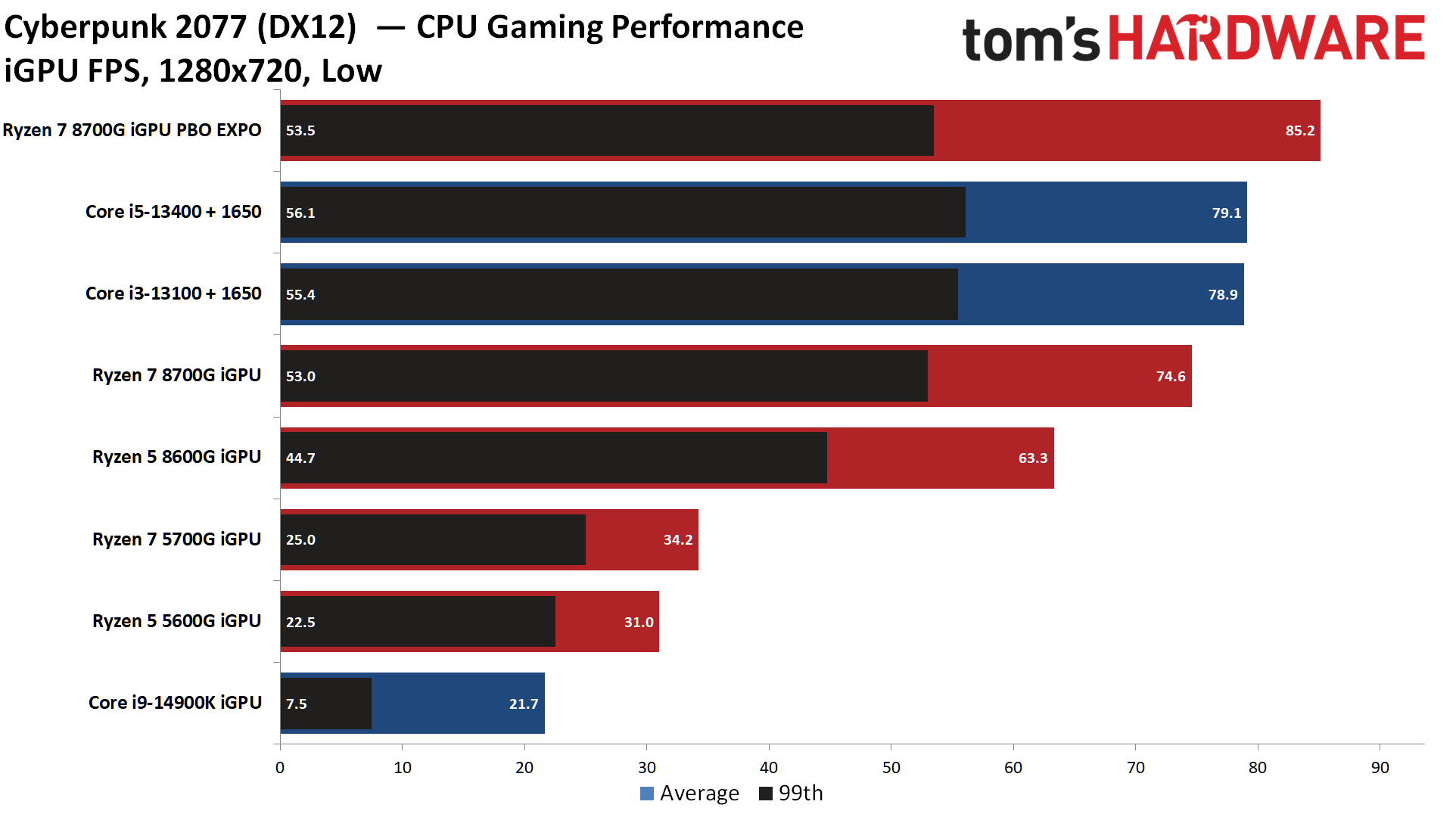
Hyper-RX delivers a win over the Core i5-13400+1650 combo, but that only occurred in three out of the eight titles in our iGPU test suite. The Ryzen 7 8700G also beats the CPU+GPU combos after overclocking, but without the Hyper-RX features. Notice also that the 99th percentile fps took a sizeable hit with Hyper-RX, indicating the hitching we mentioned before.
DOTA 2 on AMD Ryzen 7 8700G
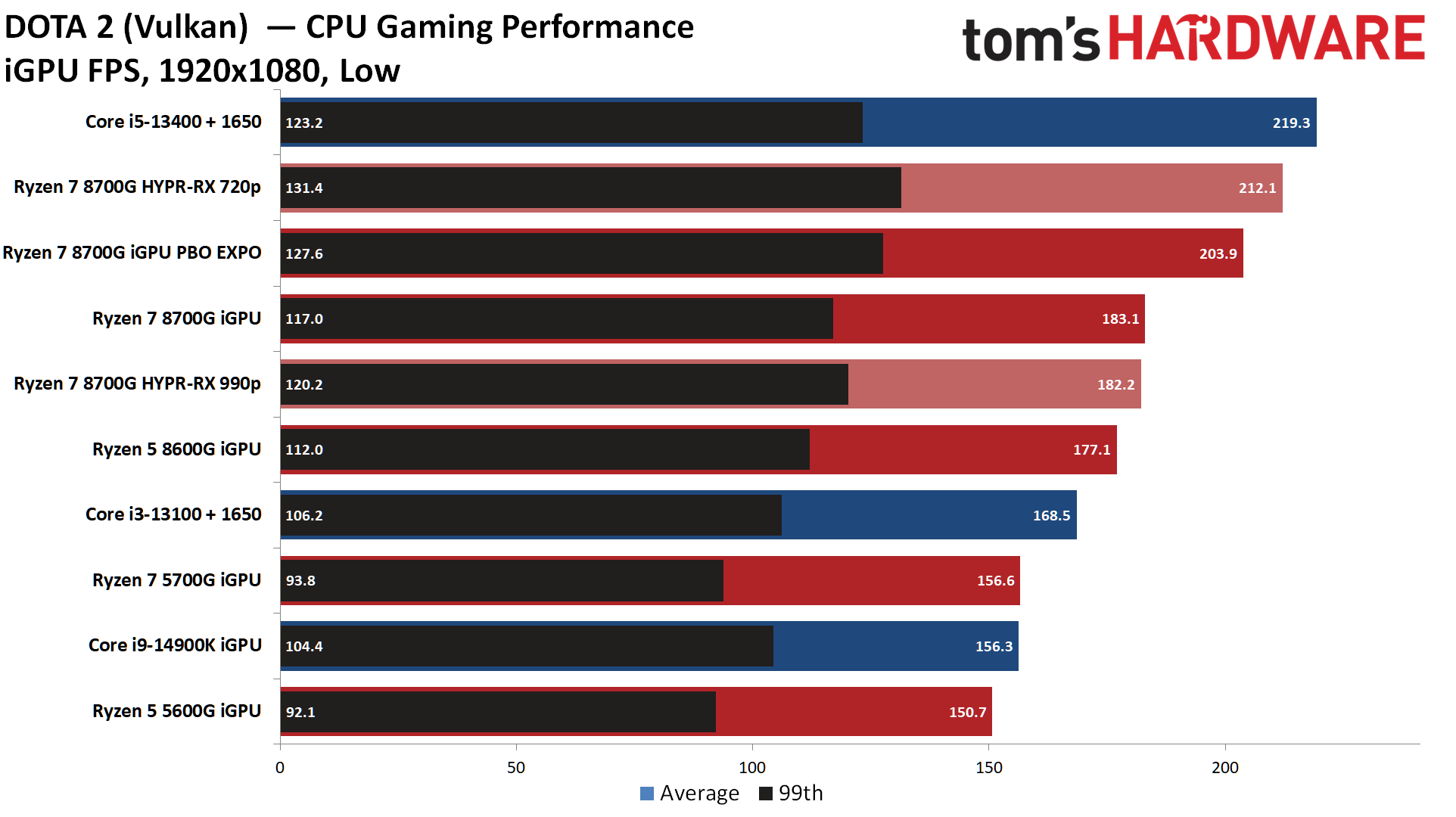
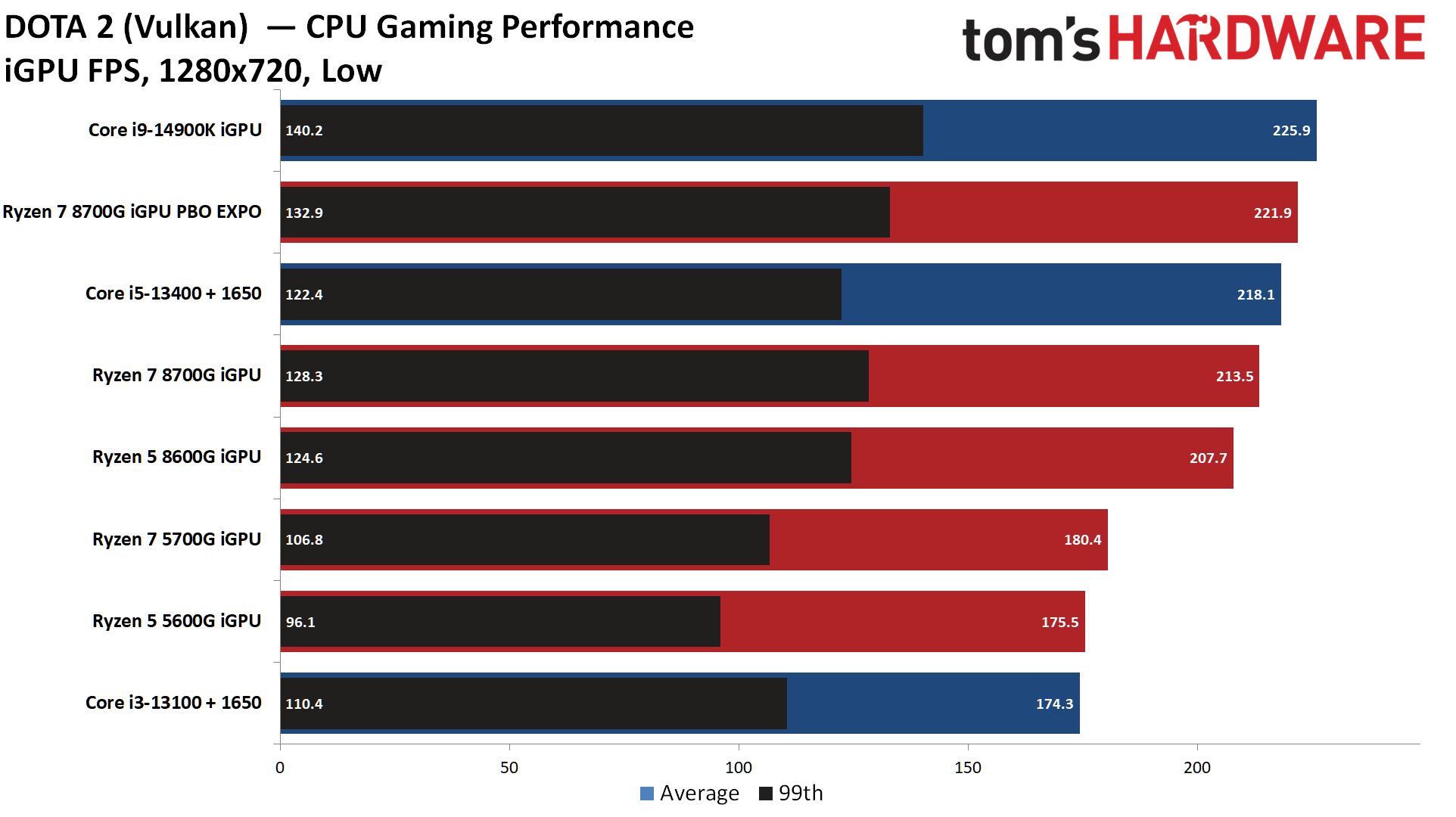
The Ryzen 7 8700G excels in this esports classic at 1080p, easily beating the competing i3-13100+1650 combo at stock settings without the fancy Hyper-RX tricks. The Core i5-13400 still scrapes out the lead, though.
This title exhibits a trend we see in several of the games we tested — the 990p to 1080p RSR upscaling actually resulted in lower performance in some games.
Flipping through to the 720p slide shows that this title can become CPU-restricted at lower resolutions, handing the Core i9-14900K its lone win in our iGPU test suite.
F1 2023 on AMD Ryzen 7 8700G
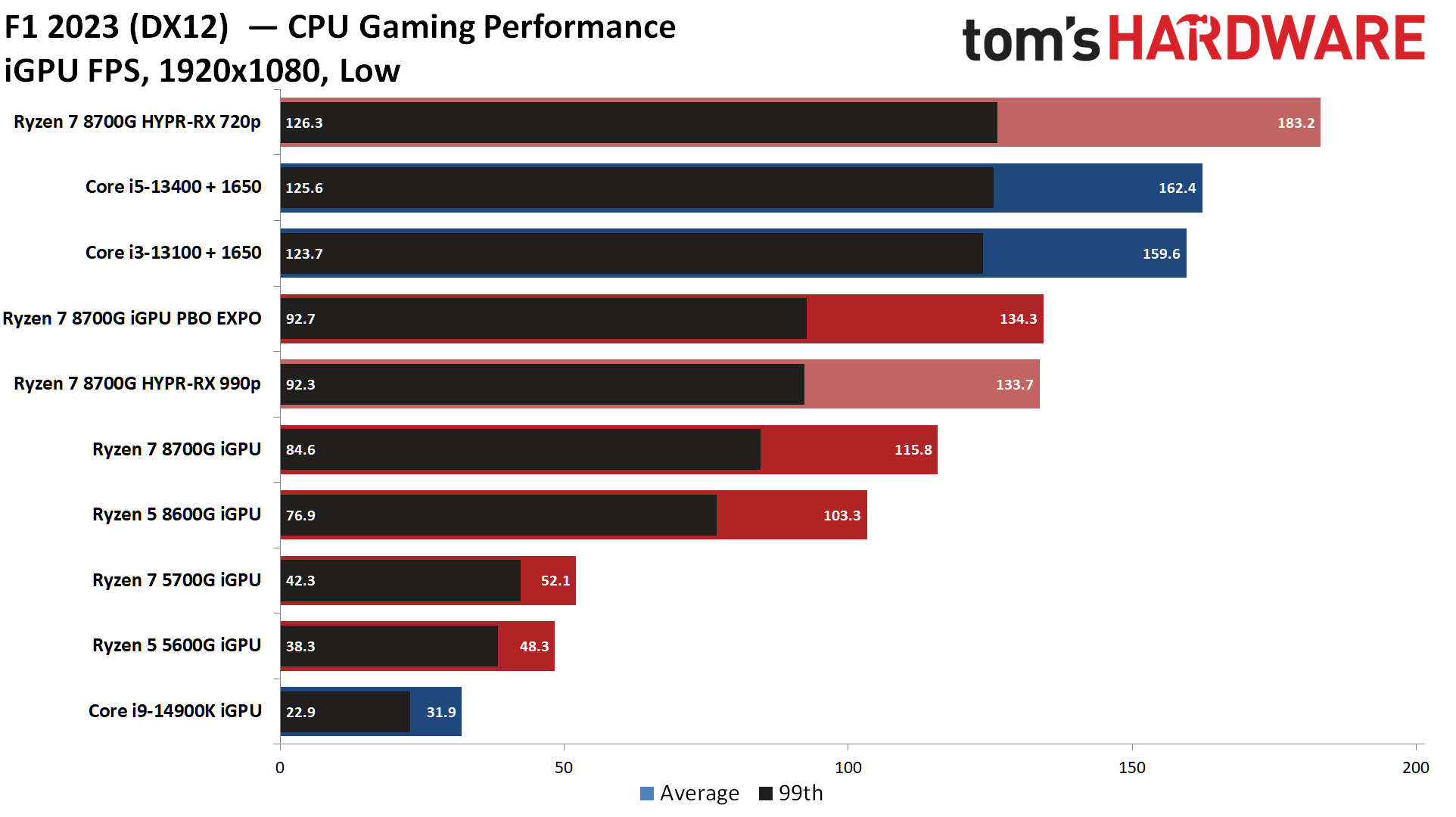
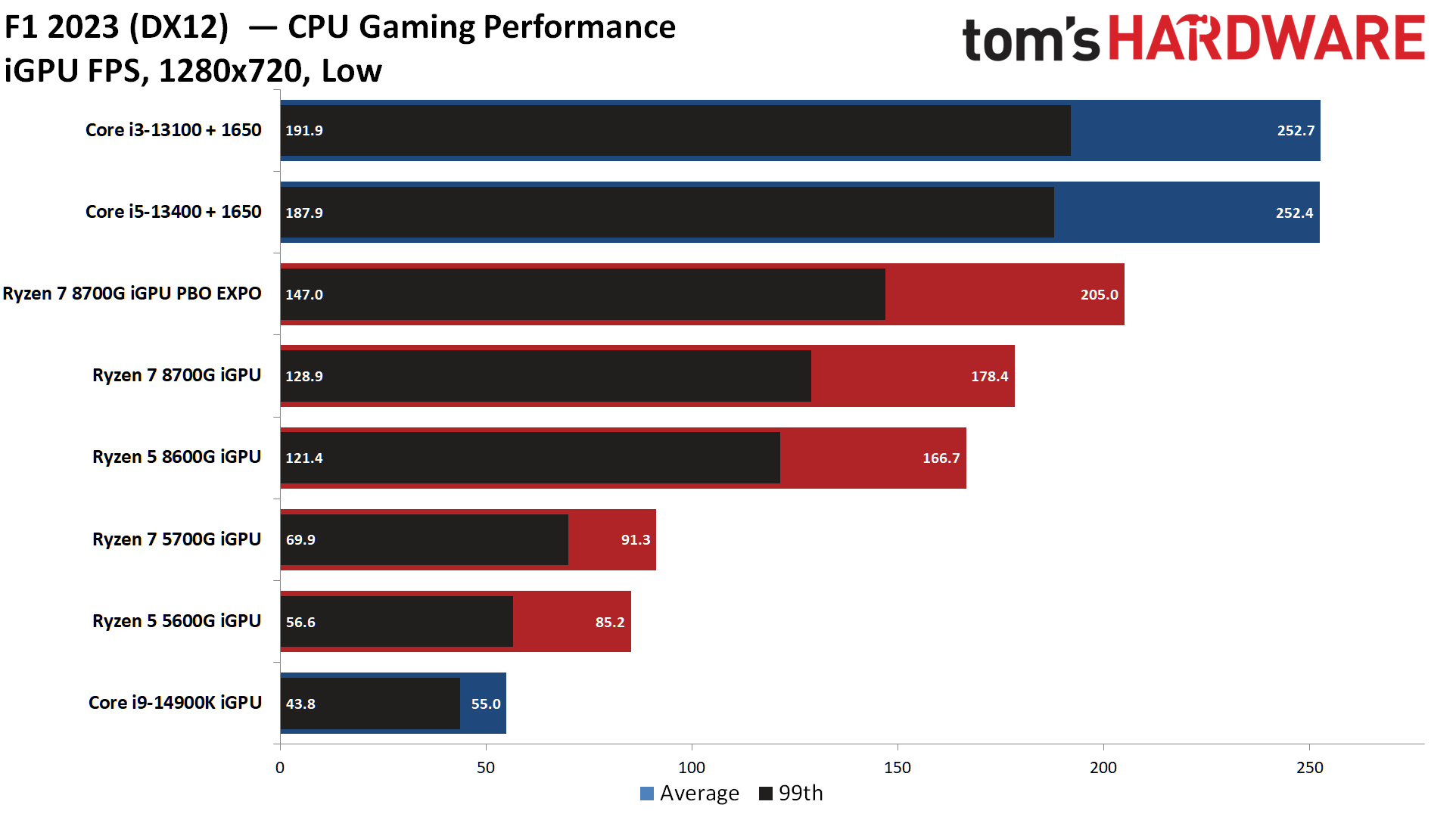
The Ryzen 7 8700G utterly destroys the previous-gen Ryzen 7 5700G in this benchmark, and engaging Hyper-RX gives it the top of the chart — and without overclocking. However, we did see noticeably lower image quality with this setting in this title, so be aware that the extra performance came with a severe tradeoff.
Far Cry 6 on AMD Ryzen 7 8700G
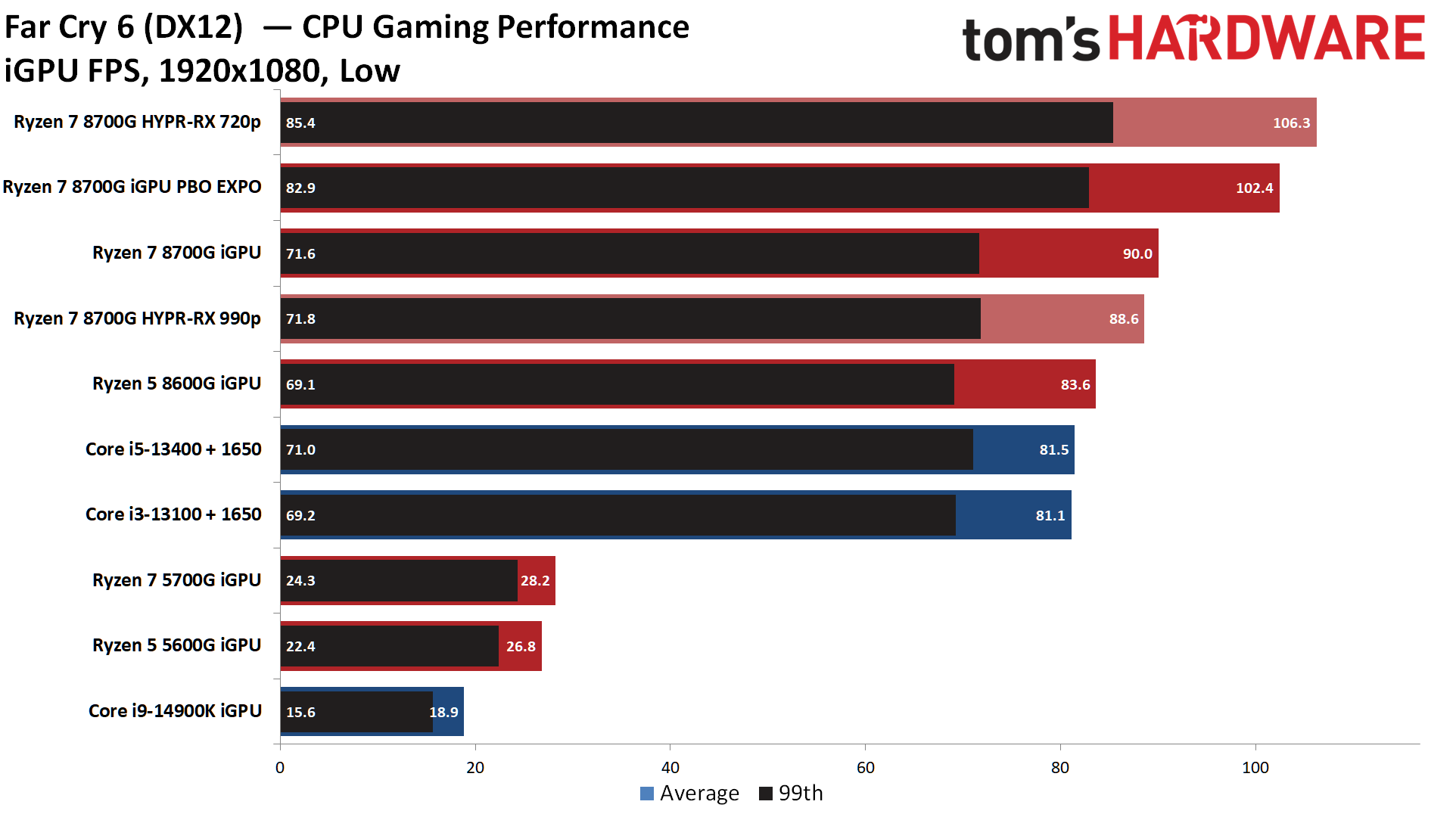
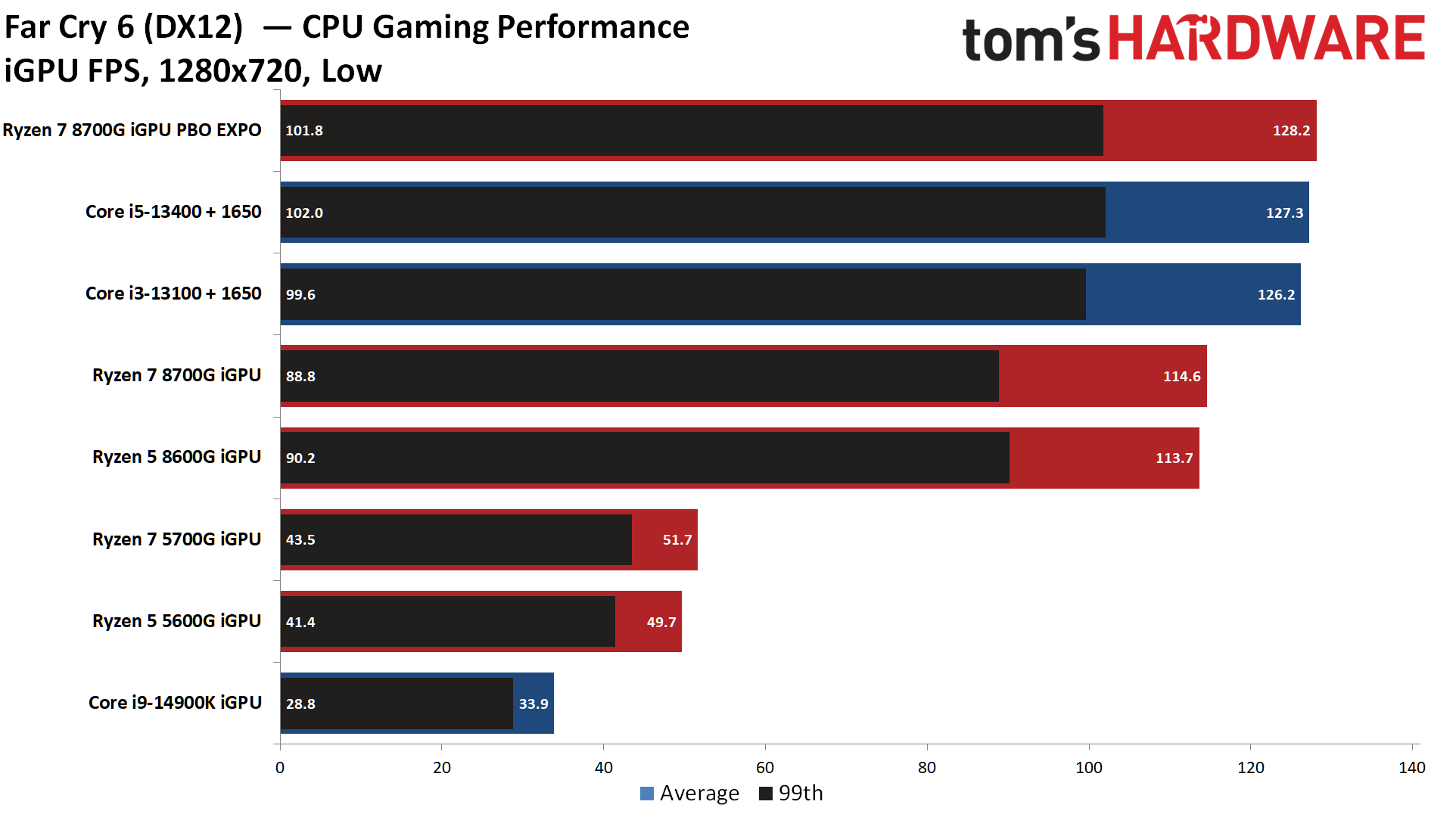
It's no surprise to see the memory-sensitive Far Cry 6 benefit tremendously from overclocking the memory, which gave the 8700G a 13% performance improvement, but it is surprising to see both of the Ryzen 8000G models beating the CPU+GPU combos in this title.
The 990p to 1080p upscaling once again results in less performance than just running the chip without the feature enabled.
Get Tom's Hardware's best news and in-depth reviews, straight to your inbox.
Grand Theft Auto V on AMD Ryzen 7 8700G
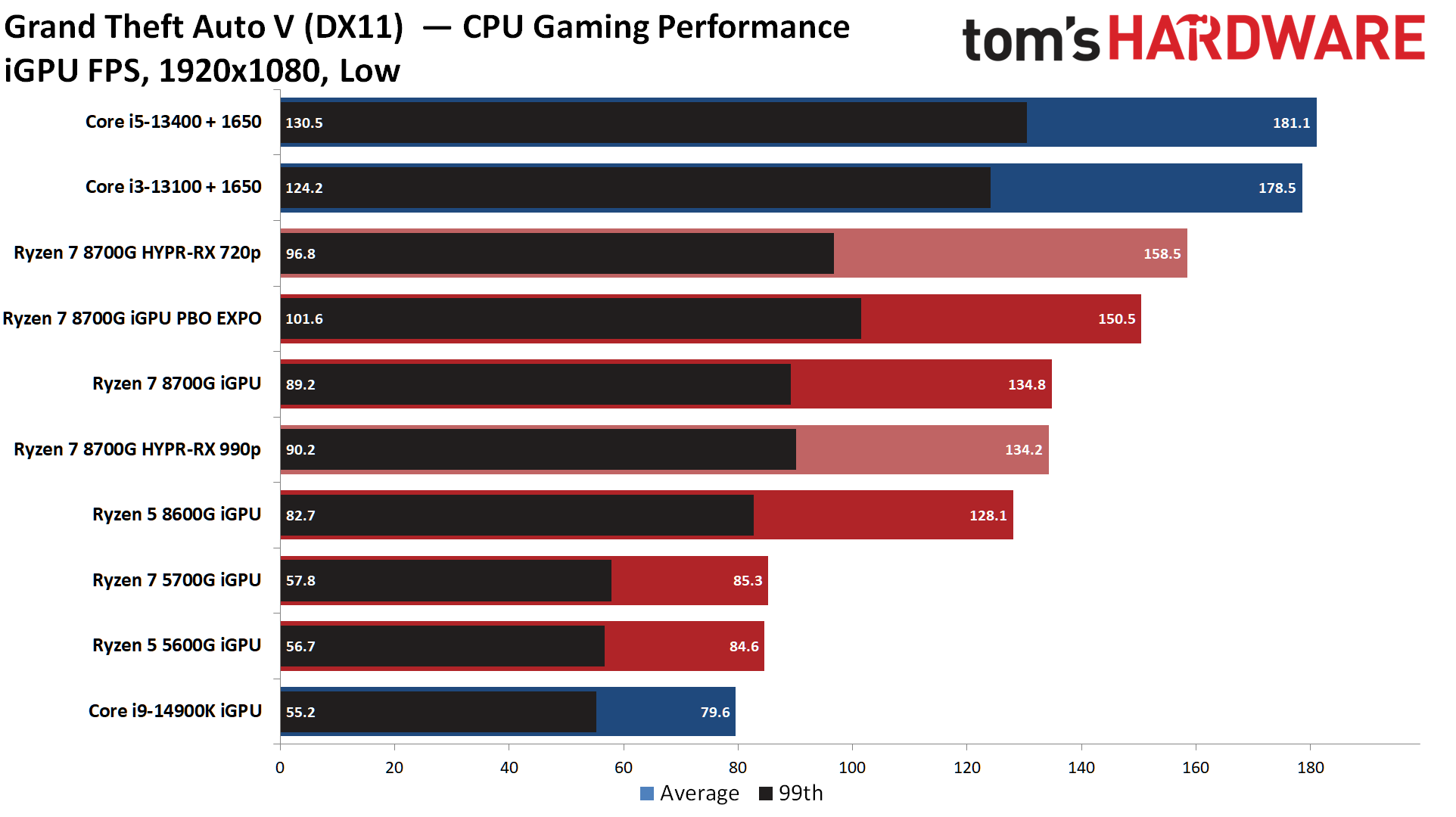
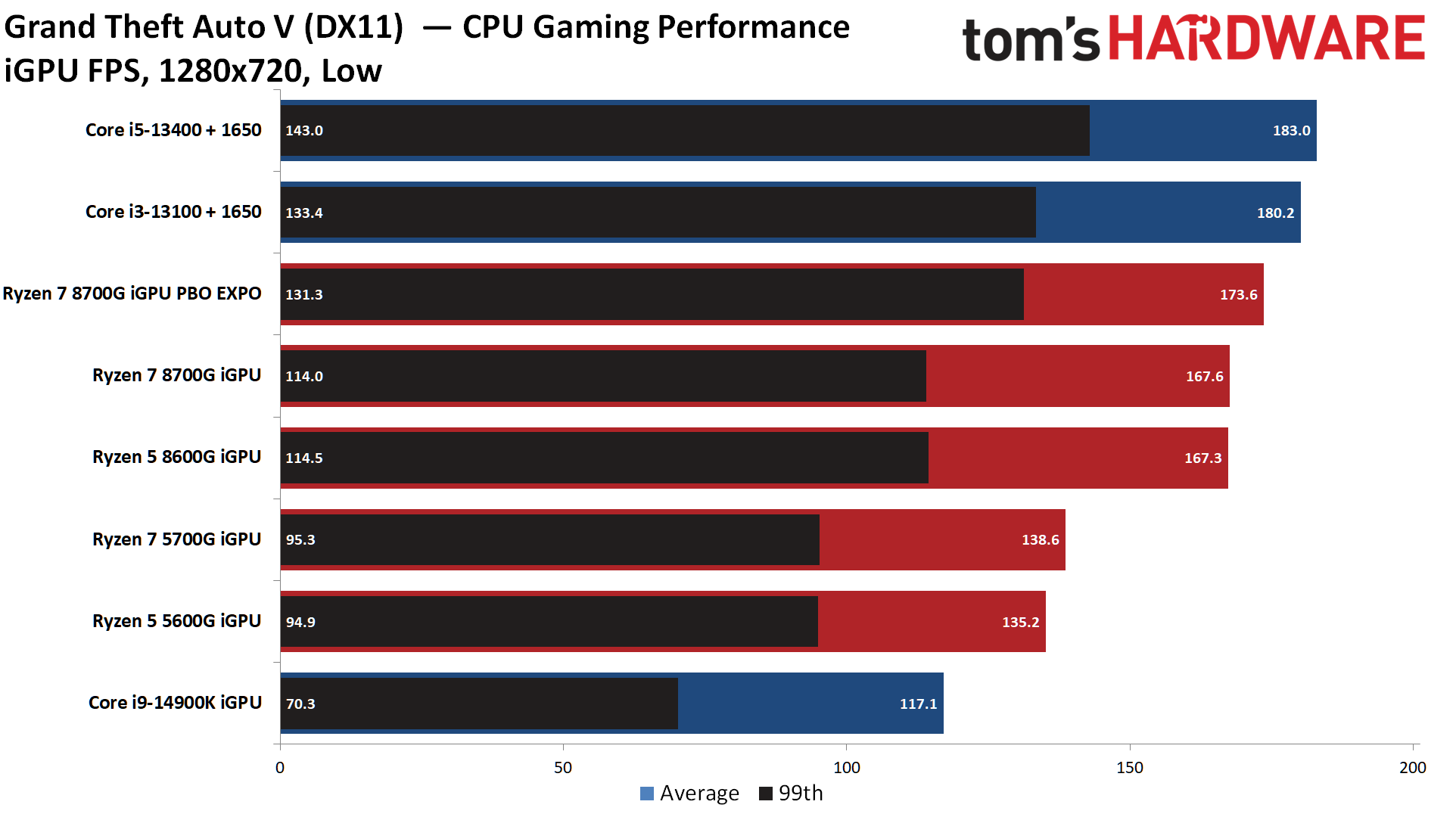
The CPU+GPU combos dominate in this title and we see that trend continue over the next few benchmarks.
Shadow of the Tomb Raider on AMD Ryzen 7 8700G
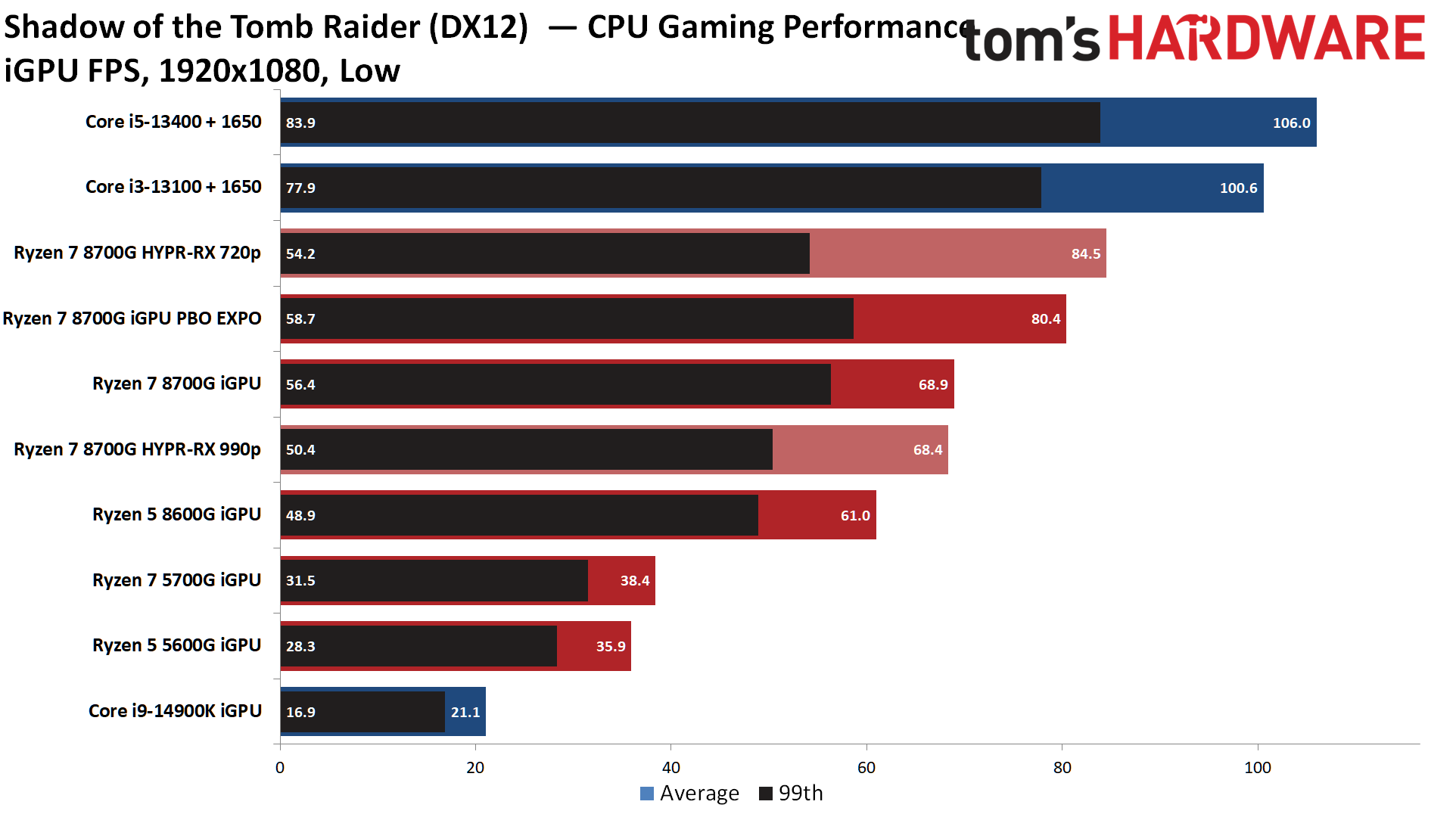
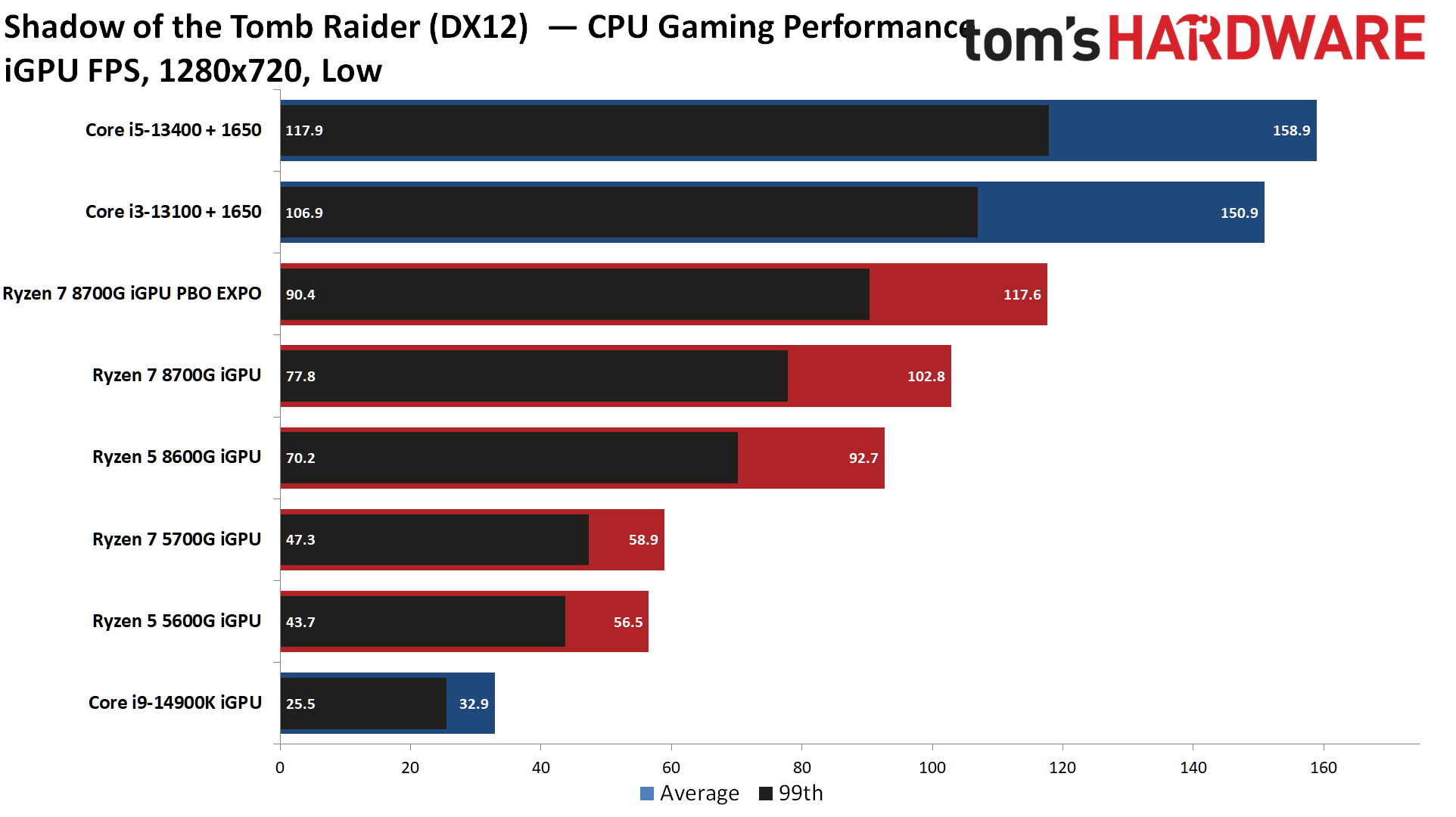
Shadow of the Tomb Raider is one of the games where the Intel CPUs with a GTX 1650 GDDR6 come out substantially ahead of the AMD APUs.
Strange Brigade on AMD Ryzen 7 8700G
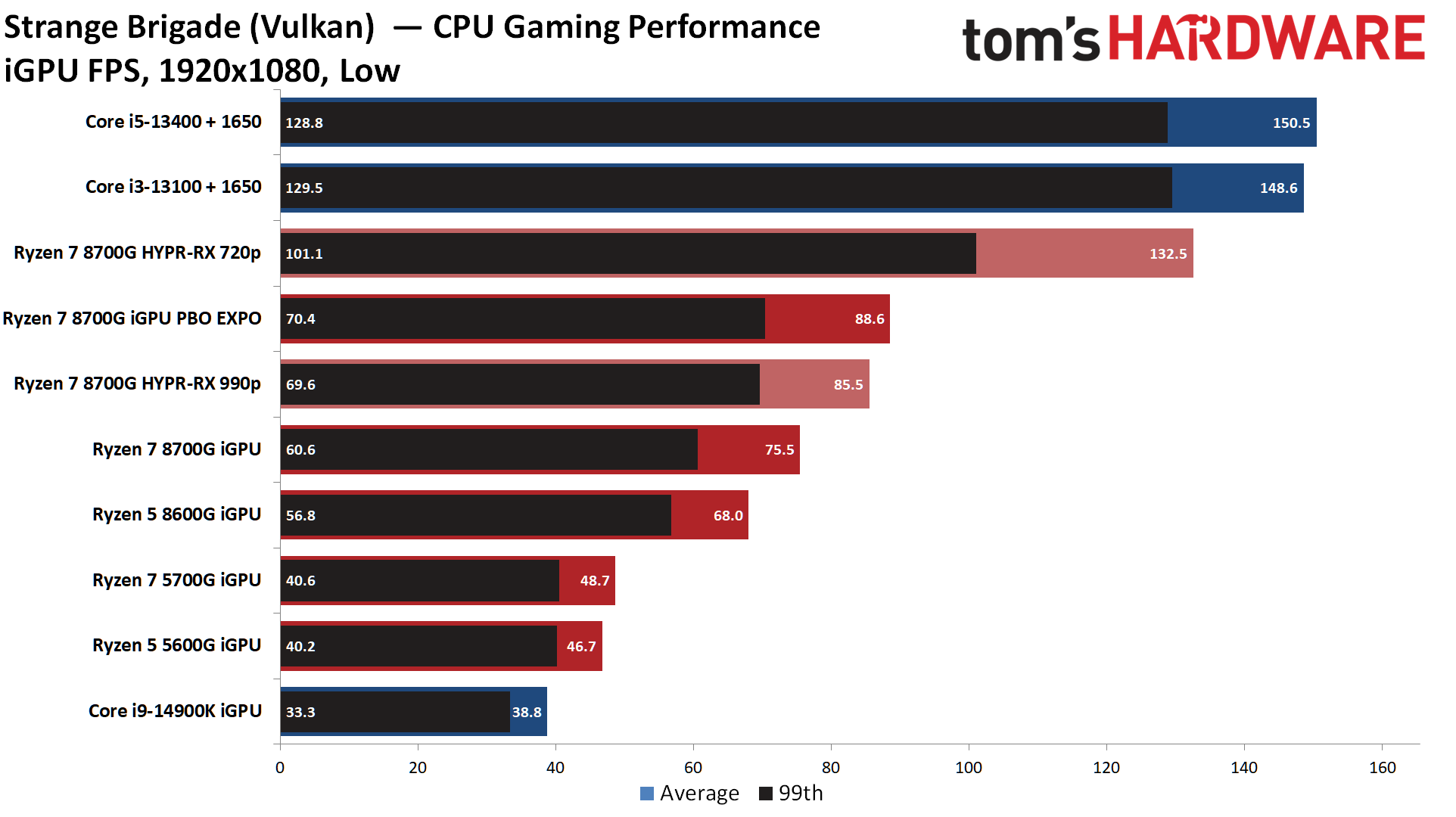
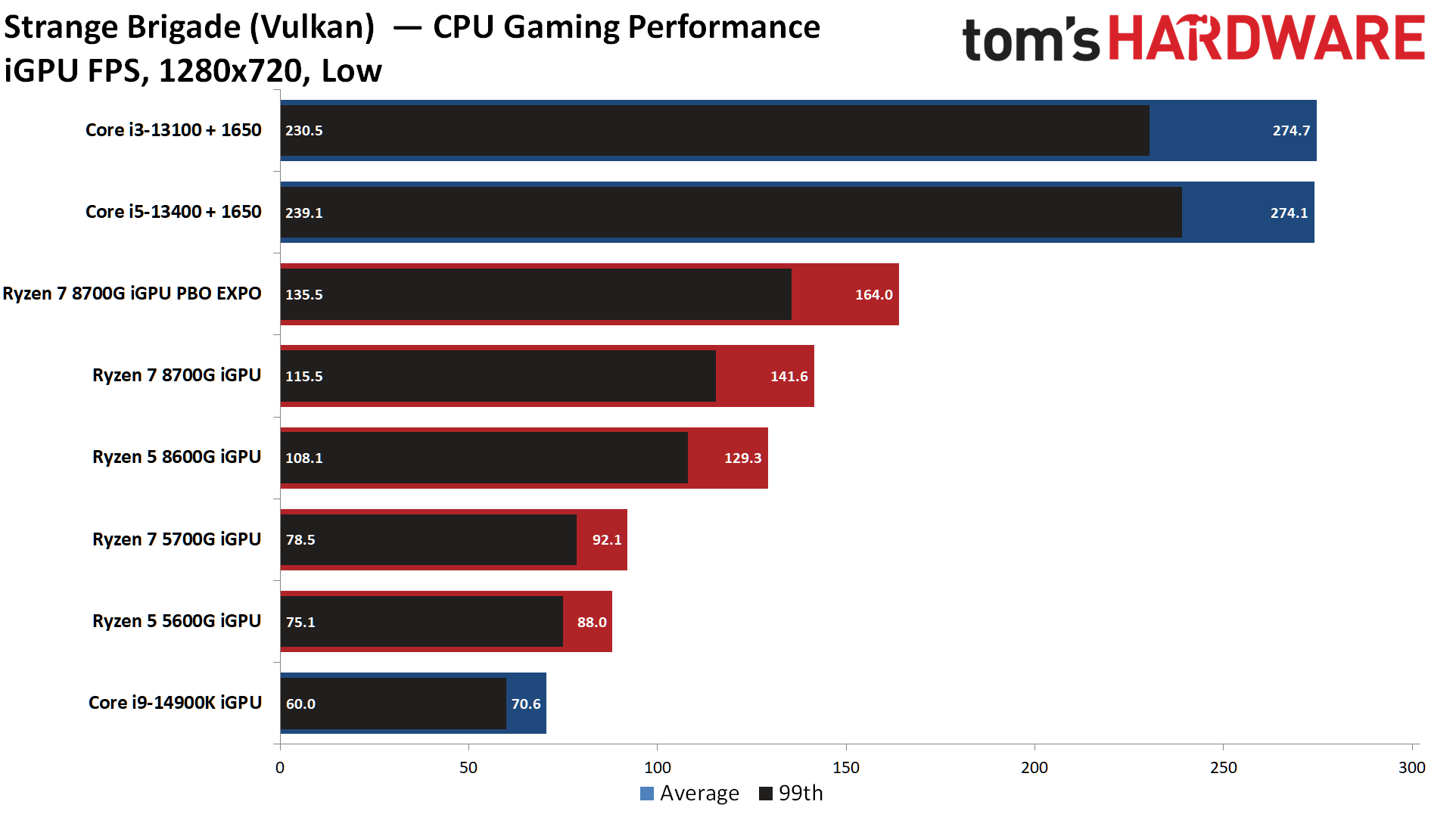
Last in our list, Strange Brigade also favors the Intel CPU plus Nvidia GPU options, even with Hyper-RX active, though that does close the gap quite a bit at the cost of image quality.
Current page: AMD Ryzen 7 8700G iGPU Gaming Benchmarks
Prev Page AMD Ryzen 7 5700G Hyper-RX, Power Consumption, Overclocking, Test Setup Next Page AMD Ryzen 7 8700G Discrete GPU Gaming Performance
Paul Alcorn is the Editor-in-Chief for Tom's Hardware US. He also writes news and reviews on CPUs, storage, and enterprise hardware.
-
usertests AMD Ryzen 7 5700G Hyper-RX, Power Consumption, Overclocking, Test SetupReply
Hyper-RX -> HYPR-RX
"The Ryzen 7 8700G utterly destroys the previous-gen Ryzen 7 8700G"
This review appears to be much more favorable to the 8700G. AnandTech did all testing at DDR5-5200.
Gamers Nexus found an issue with STAPM being enabled and degrading performance. That's Skin Temperature Aware Power Management, which obviously is not relevant to desktop APUs in a desktop computer.
There have been good bundles in the US with 7600X/7800X3D + motherboard + DDR5. Micro Center obviously but also Newegg.
https://slickdeals.net/f/17261224
If you do live near a Micro Center, take note of the stupidly low open box prices on DDR5-6000 kits. These returns aren't happening because the memory is bad. Maybe it's because they were included in so many bundles:
https://www.microcenter.com/category/4294966965/desktop-memory-ram?storeid=181 -
suryasans I will wait another year to buy Ryzen 8000G series as these APUs are still not a good value in terms of price/performance.Reply -
suryasans The included AI accelerator needs to be exposed in Gaming. It Will become a break through if the Ryzen 8700G GPU+NPU can be combined with discrete Graphics like Radeon RX 7600 to accelerate ray tracing effects in Gaming in the same FPS like Ray tracing effects disabled.Reply -
logainofhades For the price of an 8700g, 32gb ddr5 ram, and motherboard, you could build something like a 5700x, 32gb ddr4, b550 board, and an RX 6600, that would destroy the IGP in the 8700g. The price is simply too high.Reply -
jxdking 8700G is weird.Reply
Only with half the L3 cache of 7700x, it doesn't perform well in game even with a dgpu. -
logainofhades Replyjxdking said:8700G is weird.
Only with half the L3 cache of 7700x, it doesn't perform well in game even with a dgpu.
Some of those issues may be related to what GN discovered, as mentioned earlier. -
Tom Sunday Reply
The kids in their 'VANS T-Shirts' at GameStop are of a different opinion regarding all of the hoopla being now offered on the various tech channel reviews. Their argument is that the 8700G will not in real life have the same juice or capability of a (2019) GTX 1650 mobile and which so far allowed them playing quite satisfactory 80%+ of their mostly outdated and now starkly reduced on-sale games. And no matter what AMD is now promising the new 'Phoenix' chips are being capable off!suryasans said:I will wait another year to buy Ryzen 8000G series as these APUs are still not a good value in terms of price/performance.
For me these new Phoenix editions are essentially pointless as well. The three-star rating here in way telling the story! The Phoenix line I also think represents a niche product and the niche here is even smaller than with the once mighty Threadripper. Making me wonder why AMD would even bring this kind of new product to the market! Talking about niches:
Office PC: Too much GPU performance
Gaming PC: Much too little GPU performance
Parents PC: Too much GPU performance
Multimedia PC: Marginal at best
Children's PC (simple games): PossibleAccording to current rumors, Zen5 x3D will not come onto the market until 2025 and which would be my first consideration all things considered. Finally it will be curious to see in see how AMD sells or will market these new APUs through their strategic partners. -
usertests Reply
16 TOPS is weak. It has an efficiency advantage in laptops when it can be used. I don't think there's any chance that it can make upscaling or raytracing better.suryasans said:The included AI accelerator needs to be exposed in Gaming. It Will become a break through if the Ryzen 8700G GPU+NPU can be combined with discrete Graphics like Radeon RX 7600 to accelerate ray tracing effects in Gaming in the same FPS like Ray tracing effects disabled.
We'll see how XDNA 2.0 does at a significantly higher 45-50 TOPS. But I would still bet that it is not utilized by games anytime soon, or for offloading functions that are already handled by a dGPU. (I would love to be proven wrong, I still think it's a neat accelerator to have.)
Should be interesting to see how Strix Point does with increased 24 MiB L3 cache, but also a dual-CCX design.jxdking said:8700G is weird.
Only with half the L3 cache of 7700x, it doesn't perform well in game even with a dgpu. -
artk2219 AM5 really does need a cost reduction on the chipset, to help lower motherboard pricing since you cant do much about the RAM cost. Hopefully that can be addressed whenever they release the x700 series, i'm sure theyre also not worrying about it as its selling anyway, even with the high price. In the long run it's likely not sustainable, hopefully they figure that out before they have another socket 939 moment.Reply
